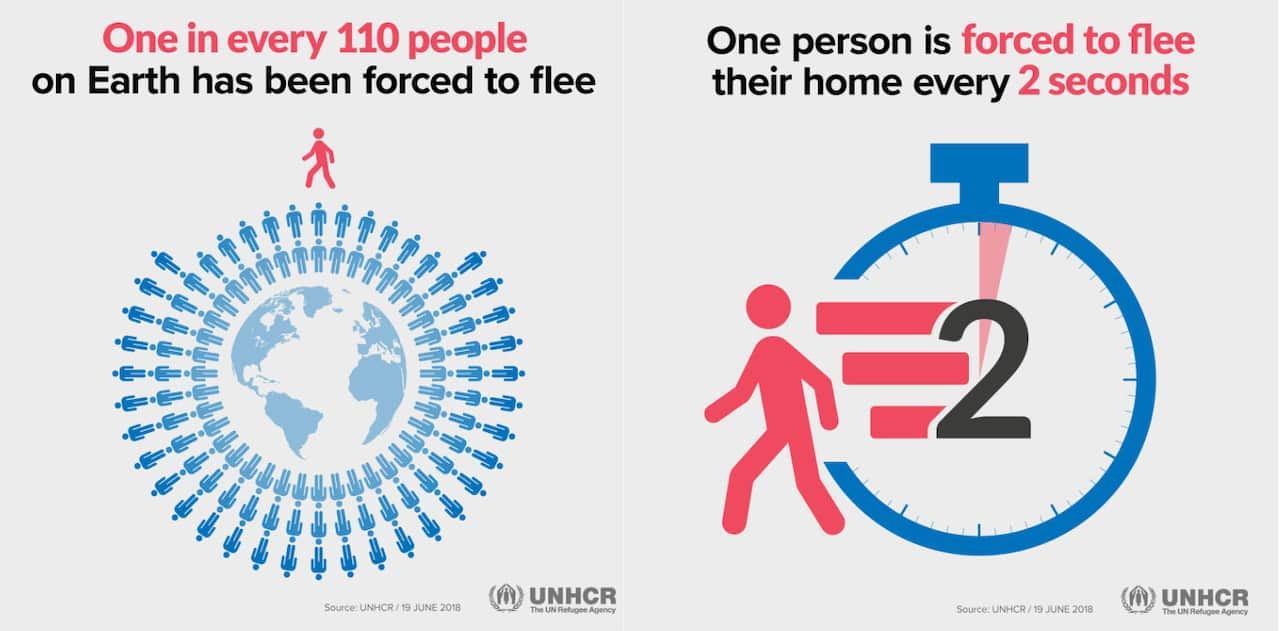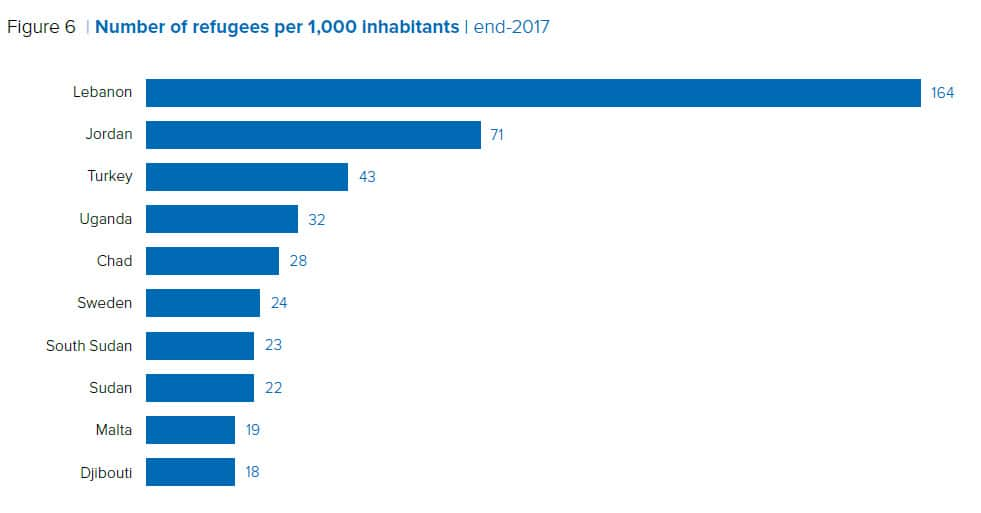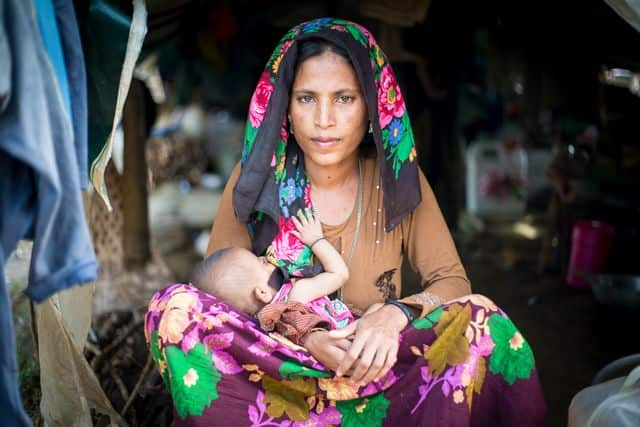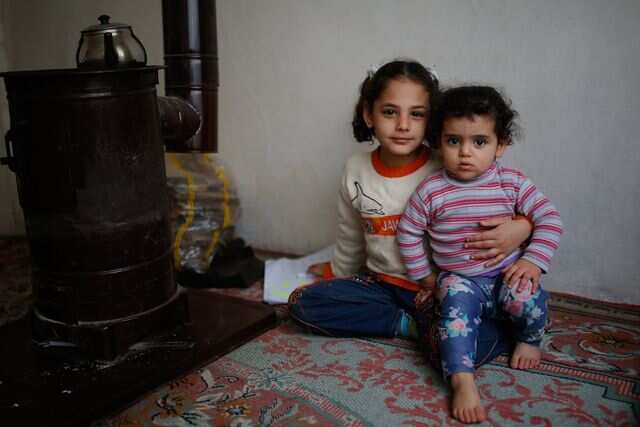By the time you finish reading this sentence, one new person will have been forced to flee their home.
That's according to a new report from the United Nations High Commissioner for Refugees (UNHCR) which found, among other things, one person on average is driven from their home every two seconds.
The UNHCR's annual Global Trends report has found forced displacement reached a new high in 2017 for the fifth year in a row due to violence and persecution.
The report said 68 million people were counted as displaced at the end of 2017. Across all countries, it said, one in every 110 people is someone who has been displaced.
The UNHCR's Deputy Regional Representative in Canberra, Nai Jit Lam, has told SBS News over 16 million people were displaced solely during 2017 - almost the entire population of Thailand.
"The numbers have increased again,” Mr Lam said.
“We are concerned because all existing conflicts appear to be continuing and new conflicts are emerging. This is causing a great pressure and strain along the entire international protection regime."

The UNHCR's 2018 Global Trends report has found some startling statistics. Source: UNHCR
Refugees escaping conflict and persecution rose by around 3 million in 2017, the biggest ever increase the UNHCR has seen in a single year.
Asylum seekers still awaiting the outcome of their claims to refugee status also rose by around 300,000.
The Global Trends report is released each year ahead of World Refugee Day on June 20 and tracks displacement based on data gathered by the UN, governments and other organisations.
Country by country
Mr Lam said the number of countries taking in large numbers of displaced people is relatively few.
He said 85 per cent of the world's displaced people are being hosted by developing countries.
"Developing countries are taking the majority of refugees,” he said.
“They need support. They need support in terms of political support, they need support in terms of resources."
Turkey was 2017's top refugee host nation in terms of absolute numbers, taking in some 3.5 million (3,424,200). Most were Syrians. Lebanon took in the most refugees (998,890) relative to its national population.
Australia admitted 15,100 refugees under UNHCR responsibility.

Lebanon took in the most number of refugees per 1,000 inhabitants Source: UNHCR
Handful of countries
Sixty eight per cent of refugees under UNHCR jurisdiction last year came from just five countries: Syria, Afghanistan, South Sudan, Myanmar and Somalia.
Australia for UNHCR spokesman Mark Macdonald said a big reason for last year's increase in displaced peoples is the situation in Myanmar.
He told SBS News the majority of Rohingya refugees who fled to Bangladesh last year are yet to return home.
“Almost 700,000 Rohingyas fled violence in northern Rakhine state and into Bangladesh last year. Many of them are still there now,” he said.
“They're living in camps. They're facing monsoon conditions. They will remain there until it's deemed safe for them to return home."

A Rohingya woman and her child in Kutupalong camp, Bangladesh. Source: UNHCR/Roger Arnold
Save the children
The 2018 Global Trends report found 53 per cent of the world's displaced peoples are children.
Many displaced children get separated from their families, often because their parents die.
The UNHCR said over 45,000 separated children sought asylum on an individual basis in 2017, but it suspects that number is actually higher due to underreporting.
Save The Children Australia's Lisa Button told SBS News children are often displaced and separated during displacement because moving large groups can be treacherous.
"It's often quite difficult to get individuals out of conflict and persecution environments,” she said.
“Families often choose to send one member of the family out on their own because they can only afford to get that one person out, or that the risk of getting a larger group out is too great.”

Two Syrian children, Vahide and Busrawho, who have been resettled in Turkey. Source: UNHCR
Internal displacement
The UNHCR said around five million people were able to return to their homes in 2017, but many returned under fragile circumstances. The majority returned from internal displacement.
Almost two thirds of the total 68 million people the UNHCR counted as displaced from their homes at the end of 2017 have not left their own countries.
Just over a fifth of that group are Palestinians.
Nai Jit Lam is calling on the international community to step in and provide safety to the growing number of displaced people around the world.
“We are facing a huge challenge. [Reducing the number of displaced people] is not going to be fixed overnight,” he said.
“Asylum is a lifeline and everybody has a part to play. Whether it's to support the refugees themselves, whether it's to support to host countries with resources or whether it's to welcome refugees when they make it to the border. Every country can play its part and do more."
Share



